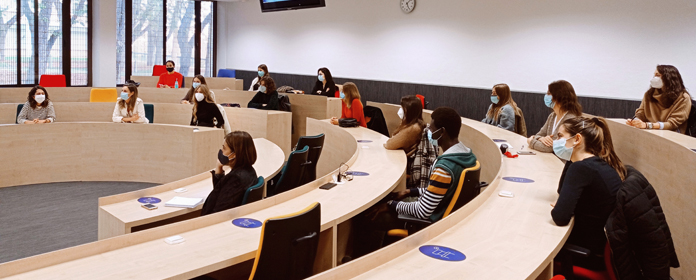20041217-Una investigadora de la Universidad de Navarra, premiada por la Asociación Española de Farmacéuticos de la Industria
A researcher from the University, awarded by the Spanish Pharmaceutical Industry association
With Maria Santodomingo's study, progress is made in the fight against liver tumors.
María Santodomingo, from department of Pharmacy and Pharmaceutical Technology of the University of Navarra, has developed a way to reduce the adverse reactions of a substance that induces the synthesis of interleukin-12, which has a potent effect against liver tumors. This research has earned him the first award in the Poster Competition of the XXIV Symposium of the association Spanish Industry Pharmacists.
The work for which she was distinguished carries the degree scroll of development and characterization of vectors with Doxycycline to regulate the expression of therapeutic genes in the liver and is part of the project that she is carrying out as a member of the first promotion of the specialization in Industrial and Galenic Pharmacy of the University of Navarra. She is one of the five students spanish pharmacy residency program of the School of Pharmacy of the academic center.
Fewer antibiotic administrations per dayInterleukin-12 is a substance produced by the body itself, which is very effective against liver tumors. However, despite this benefit, it is necessary to regulate its synthesis, because it can trigger negative effects for the organism. By means of gene therapy, a system has been developed that achieves this regulation. It is activated by the administration of the antibiotic Doxycycline, which, when administered orally, has adverse effects mainly of subject digestive.
Due to these adverse reactions and the need for the effect to occur only in the liver, it is necessary to develop new systems that allow selective targeting of the antibiotic to this organ.
The technique consists of vectors (nanoparticles and liposomes) that incorporate the drug. This avoids the problems associated with oral administration, from nausea and diarrhea to esophageal ulceration. It also allows the drug to be selectively targeted to the liver.
When these vectors are administered intravenously, they are detected by the body as foreign particles. This causes certain cells, such as liver macrophages, to capture them, which has two positive consequences: the adverse effects of Doxycycline are reduced and the number of administrations of the antibiotic per day issue is reduced. Thus, the synthesis of interleukin-12 is more specifically regulated.


